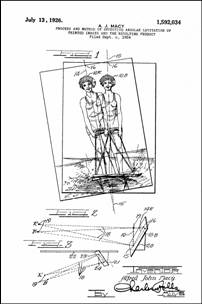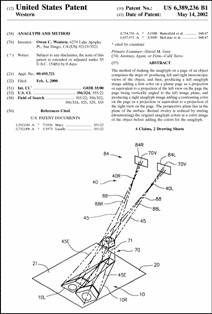

Patents
I know of three patents relevant to Phantograms. My comments
on them are those of a laymen
and you should take them in that way. If you need a real legal opinion on what
they cover or
how they relate to each other, you should consult a patent lawyer. If you know
of any other
patents relevant to Phantograms, please let me know.
Click on the patent image to download a PDF version of the complete patent. Note
that this
is not an "official" copy. If you need one, go to the Patent Office site:
http://www.uspto.gov/
 |
"Process and Method of
Effective Angular Levitation of Printed Images and the Resulting Product" A.J. Macy Patent Number: 1,592,034 Filed: Sept. 6,1924 Issued: July 13, 1926 |
This patent describes a method of making an anaglyph image
appear at an angle to the
surface it is printed on. The technique described involves rotating the two
stereo images
about a common point. At first glance this seems like a good way to produce
major vertical
alignment problems in an image that would not be viewable.
The claims in the patent do not describe this technique but claim "... images of
an object
in such angular relationship to each other as to neutralize the angle of
inclination of the
inclined stereogram and to display the image in a substantially vertical
position......". Sounds
like a Phantogram to me.
My first impression was that this was not a very well thought out idea. But Macy
has several
other patents that show a deep understanding of stereo so I spent some serious
time thinking
about it and realized he did know what he was talking about. I have made
viewable images
using this technique. They have problems not present in other forms of
Phantogram but are
still interesting.
 |
"Anaglyph and Method" Owen C. Western Contact Information: 3D On The Level Patent Number: 6,389,236 Filed: Feb. 1, 2000 Issued: May 14, 2002 |
This patent is specific to anaglyph Phantograms. It does not
address any other method of
displaying an image. The description of how to make a Phantogram seems a little
vague
to me and the patent claims do not specify photographic images but seem to claim
all
Phantograms including hand drawn ones. I find the claims very difficult to
follow.
This is a very well written patent. It references previous use
of Phantogram illustrations in
drawings. It covers virtual all forms of stereo image presentation and
specifically refers to
images created by digital manipulation. Images created optically do not appear
to be covered.
The drawings and explanation of how to make Phantograms are clear enough to
enable
a careful reader to figure out how to make them. The language is a little had to
follow, like
most patents, but it can be understood and is well worth studying.
Note: The method of making Phantograms I show in the presentation on this site
is probably
covered by this patent.